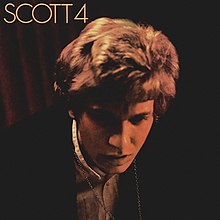Scott 4
| Scott 4 | ||||
|---|---|---|---|---|
 |
||||
| Studio album by Noel Scott Engel | ||||
| Released | November 1969 | |||
| Recorded | Olympic Studios, London, 1969 | |||
| Genre | ||||
| Length | 32:28 | |||
| Label | Philips / Fontana | |||
| Producer | John Franz | |||
| Noel Scott Engel chronology | ||||
|
||||
| Professional ratings | |
|---|---|
| Review scores | |
| Source | Rating |
| AllMusic | |
| Pitchfork | 9.0/10 |
| Trouser Press | favorable |
Scott 4 is Scott Walker's fifth solo album (a collection of songs he had performed for his BBC television series had been his fourth). It was originally released in late 1969 under his birth name, Noel Scott Engel, and failed to chart. Subsequent reissues have been released under his stage name. It has since received praise as one of Walker's best works.
Scott 4 was the first Walker album to consist solely of self-penned songs—Scott, Scott 2 and Scott 3 had each featured translations of Jacques Brel songs, which were later compiled to form the album Scott Walker Sings Jacques Brel, and the earlier albums had also featured some songs from other sources.
The quote "a man's work is nothing but this slow trek to rediscover, through the detours of art, those two or three great and simple images in whose presence his heart first opened" (credited to the French-Algerian writer Albert Camus) appears on the back of the sleeve of the album.
The opening track, "The Seventh Seal," is based on the 1957 film of the same name by filmmaker Ingmar Bergman.
The second track on side B, "The Old Man's Back Again (Dedicated to the Neo-Stalinist Regime)" refers to the 1968 Warsaw Pact invasion of Czechoslovakia.
The album failed to chart and was deleted soon after. It has been speculated that Walker's decision to release the album under his birth name of Noel Scott Engel contributed to its chart failure. All subsequent re-issues of the album have been released under his stage name.
Today Scott 4 is considered as one of his strongest works and it has been acknowledged in the book 1001 Albums You Must Hear Before You Die amongst others. It has also been praised by known artists such as David Bowie and the members of Radiohead.
...
Wikipedia
